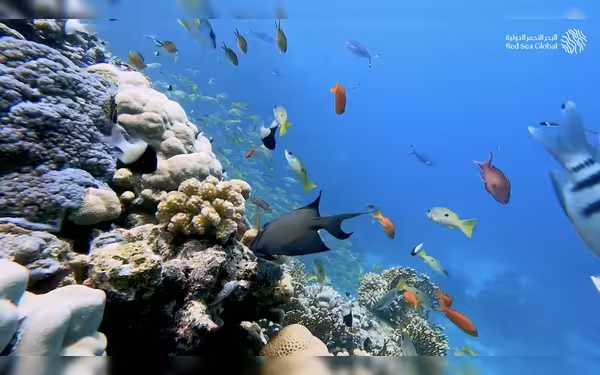Saturday, October 5, 2024 10:29 PM
Saudi Arabia's Sustainable Tourism and Marine Conservation Efforts
- Saudi Arabia prioritizes marine biodiversity in tourism development.
- Red Sea's coral reefs show resilience against climate change.
- Red Sea Global leads sustainable luxury tourism projects.
 Image Credits: arabnewspk
Image Credits: arabnewspkSaudi Arabia develops tourism while protecting marine ecosystems, showcasing resilience and commitment to sustainability.
Saudi Arabia is making significant strides in developing its tourism sector while simultaneously protecting its precious marine ecosystems. The coastal waters of the Kingdom are home to a rich variety of marine life, including coral reefs, seagrass meadows, and mangrove forests. These ecosystems are not only vital for local fisheries but also play a crucial role in supporting a growing tourism industry. As climate change and human activities pose threats to these natural treasures, the protection of marine biodiversity has become a national priority for Saudi Arabia.
One of the most remarkable features of Saudi Arabia's marine environment is the Red Sea, which is known for its incredible biodiversity. It is home to over 1,000 species of fish and approximately 265 types of coral. This unique ecosystem is essential for the livelihoods of local communities and is deeply intertwined with the cultural heritage of the Kingdom. Raed Al-Basseet, a key figure in environmental sustainability at Red Sea Global, emphasizes the importance of these coastal ecosystems, stating, "Economically, these ecosystems are essential to local fisheries, tourism, and coastal protection, playing a key role in supporting local livelihoods and generating revenue that contributes to Saudi Arabia’s growing economy."
Moreover, the Red Sea's coral reefs exhibit remarkable resilience, particularly in the face of rising ocean temperatures. Unlike many other regions where coral reefs are suffering from bleaching, the northern Red Sea corals have shown extraordinary heat tolerance. This resilience not only supports marine biodiversity but also positions these reefs as potential models for coral regeneration projects worldwide. Marine scientists are eager to study these corals to understand their ability to thrive in warmer conditions, which could provide valuable insights for protecting more vulnerable reefs globally.
Saudi Arabia's Vision 2030 initiative aims to diversify the economy while ensuring a sustainable future that balances development with environmental protection. A key aspect of this vision is the promotion of restorative tourism, which seeks to attract visitors while minimizing environmental impact. The pristine waters and thriving coral reefs along the Red Sea coastline present immense opportunities for eco-friendly tourism, appealing to divers, researchers, and nature enthusiasts alike.
Red Sea Global, a Saudi company, exemplifies the Kingdom's commitment to marine conservation. The company is leading the development of sustainable luxury tourism projects, such as AMAALA and The Red Sea, which align with the Vision 2030 agenda. AMAALA focuses on wellness and art-inspired luxury, while The Red Sea features an archipelago of pristine islands and coral reefs designed to attract eco-conscious travelers. Al-Basseet highlights the company's efforts, stating, "We’ve also designated conservation zones on several islands, with 75 percent of AMAALA’s coastline protected." This commitment to conservation is supported by cutting-edge technology that monitors and safeguards marine biodiversity.
In collaboration with the Coral Research & Development Accelerator Platform, Red Sea Global is spearheading initiatives to protect and regenerate coral reefs. The company plans to open a state-of-the-art coral breeding lab to nurture juvenile corals for restoration projects. By breeding and relocating coral fragments, they aim to strengthen coral populations, especially in areas facing environmental pressures.
Additionally, Red Sea Global conducted an extensive environmental survey covering 250 km of coastline, providing valuable insights into the health of local ecosystems. This survey revealed critical breeding sites for endangered species, such as hawksbill and green turtles, underscoring the region's importance in global biodiversity. Al-Basseet stated, "RSG is fully committed to achieving a net conservation benefit of 30 percent by 2040," highlighting the company's dedication to environmental stewardship.
Saudi Arabia's efforts to develop its tourism sector while protecting its marine ecosystems reflect a forward-thinking approach to sustainability. By prioritizing the preservation of marine biodiversity, the Kingdom not only safeguards its natural heritage but also ensures that future generations can enjoy the beauty and benefits of its coastal waters. As the world increasingly recognizes the importance of environmental conservation, Saudi Arabia's initiatives serve as a model for balancing economic growth with ecological responsibility.













